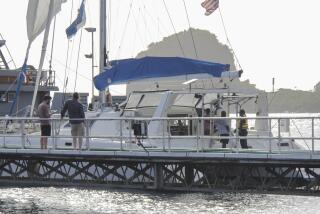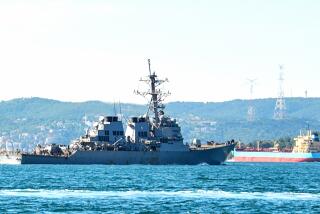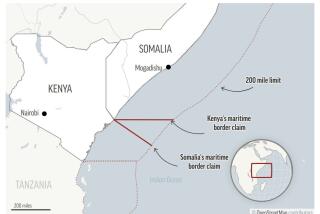High seas drama emerges in piracy-murder trial
NORFOLK, Va. — As heavily armed pirates held an American sailboat off the coast of Somalia in February 2011, Navy SEALs on the bridge of the guided missile destroyer Sterett heard one of the hijackers on the radio threatening the lives of his four American hostages.
“I am holding these people. They are like meat,” he said. “I will eat if you head my way.”
What happened next is providing riveting testimony in a federal courtroom here as three rail-thin Somali men in baggy coats face the first U.S. murder trial of piracy suspects in nearly two centuries.
Prosecutors say the dead Americans — boat owners Scott and Jean Adam of Marina del Rey and their friends Robert Riggle and Phyllis Macay of Seattle — were shot by pirates who had hoped to hold them for ransom and refused to surrender them to Navy negotiators.
“They were bent on money, bent on avoiding capture and willing to dispose of innocent life to meet these goals,” Assistant U.S. Atty. Brian Samuels told jurors in opening arguments.
Defense attorneys argued that their clients didn’t fire the shots that killed the Americans, and they said the prosecutors’ case relies on other convicted Somalis who agreed to testify in hopes of reduced prison sentences.
The shooting 60 miles at sea occurred after the Sterett, the aircraft carrier Enterprise, the guided missile cruiser Leyte Gulf and the guided missile destroyer Bulkeley responded to help the Americans aboard the 58-foot cruising sloop Quest. Pirates had boarded the yacht five days earlier, on Feb. 18, 2011.
Negotiations broke down and the Sterett moved to block the pirates from steering the Quest toward the Somali coast. A military helicopter circled overhead.
That triggered what defense lawyers called a moment of chaos.
One of the pirates fired a rocket-propelled grenade toward the Sterett. The rocket sailed over the ship and fell into the sea.
Then, defense attorneys say, Navy snipers aboard the destroyer fired at the sailboat. That triggered furious gunfire in the cockpit, where the four hostages were held. Each suffered multiple gunshot wounds.
Navy Cmdr. Darren McPherson, the Sterett’s commander, denied Friday that anyone aboard his ship, including Navy snipers, had fired their weapons. He said that all of the shooting was aboard the sailboat.
McPherson said he had ordered his crew “not to fire on the Quest even if fired upon” out of concern for the hostages’ safety.
Twelve Somalis already have pleaded guilty or have been convicted of piracy in the case, and all were sentenced to life in prison. The three charged with murder — Ahmed Muse Salad, Abukar Osman Beyle and Shani Nurani Shiekh Abrar — could face the death penalty if convicted.
Larry Dash, Salad’s attorney, said the Navy provoked the pirates by refusing to release two men whom the others had sent to negotiate aboard the Sterett. The Navy flotilla also had inched closer to the Quest despite Scott Adam’s pleas that they were making his young captors jumpy, Dash said.
“They believed they were in danger so long as American warships, including the Sterett, were in sight,” Dash said.
After the gunfire, Navy SEALs boarded the Quest. They found two pirates shot dead, killed two others who prosecutors said resisted capture, and took the remaining 15 into custody.
Jurors at U.S. District Court in Norfolk also heard Friday from Elizabeth Sem, Scott Adam’s daughter. She fought back tears while recounting how her father’s love of sailing had taken him around the world, from China to the South Pacific and across the equator multiple times.
The Adams had their beloved Quest custom-built in New Zealand with $1.5 million that they raised by selling their homes. Jean Adam, 66, had been a dentist; Scott Adam, 70, was an assistant director on films and TV shows including “The Dukes of Hazzard” and “The Love Boat.”
“My dad had a lifelong dream to sail around the world, and Jean supported that,” Sem said.
The Adams’ final trip had them sailing west from Mumbai, India, toward Salalah, Oman, with Riggle, 67, and Macay, 59, as crew. The Adams had never sailed in those waters, which were notorious for pirates at the time, and for part of the journey they sailed with other yachts for safety.
For unknown reasons, the Quest separated from the convoy. The four Americans were alone about 200 miles south of Oman when 19 pirates armed with AK-47 assault rifles and at least two grenade launchers boarded their boat and ordered them to change course for Somalia.
Listening through an interpreter, the defendants looked on with expressionless faces.
The case marks “the collision of the First World and the Fourth World,” said Larry Woodward, Beyle’s attorney.
The trial is expected to last several weeks.
More to Read
Start your day right
Sign up for Essential California for news, features and recommendations from the L.A. Times and beyond in your inbox six days a week.
You may occasionally receive promotional content from the Los Angeles Times.







